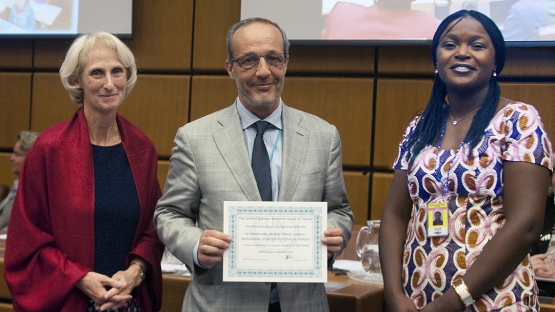The IAEA's Programme of Action for Cancer Therapy (PACT) received a €16,000 grant from the United Nations Women's Guild (UNWG) in Vienna, on behalf of two child cancer units in Ghana and Viet Nam. The funds will provide much needed improvements, equipment and toys for their facilities and services.
As part of PACT's commitment to expanding access to cancer services in developing countries, the Programme proposed two projects to be funded in 2016, which caught the attention of the UNWG. The specialised paediatric units at the Korle-Bu Teaching Hospital in Accra, Ghana, and the National Cancer Centre (NCC) at the K Hospital in Hanoi, Viet Nam. The €8,000 injection of funds they both receive will further improve the services they can offer to children with cancer. This is particularly important as the availability of such care is limited in these countries.
The Korle-Bu Paediatric Oncology Unit is one of only two paediatric facilities in Ghana. The award will be used to purchase urgently needed items such as infusion pumps delivering exact amounts of medication in a given time, diagnostic sets to accurately locate potential infections, as well as beds, storybooks and toys.
"We are enormously grateful for this award from the UN Women's Guild," said Professor Lorna Renner, Head of Paediatric Oncology Unit at the Korle-Bu Teaching Hospital. "Our unit relies a lot on donations such as this. We can now buy essential equipment that will greatly improve the health and wellbeing of the 150 young cancer patients we are able to see each year. The new beds and toys will also make their experience a little easier."
The paediatric department at the K Hospital in Hanoi has already treated 140 children this year, with over 40 staying at the unit. The new funds will help with upgrading the children's playroom. This space is particularly important as it helps reduce the distress children face when receiving treatment.
Upon accepting the awards, Luca Li Bassi, PACT's Senior Health Systems Strengthening Specialist said, "The UNWG has offered six grants to PACT since 2008. All of them have greatly helped to meet the needs of cancer services for women and children". Mr Li Bassi continued, "strong partnerships and support like this are fundamental for improving cancer care in the developing world as well as for drawing attention to the high burden of cancer that many countries face."
"The UN Women's Guild in Vienna is honoured to support such worthy causes as these cancer units in Ghana and Viet Nam," said Diana Oyugi, the UNWG President. "In our 45 year history, the UNWG has aimed to support projects which improve the lives of vulnerable children around the world. We hope that these awards help to relieve the suffering felt by these cancer patients".
Since 1967, the UNWG have raised and donated more than €5.3 million to children's charities. This year, 31 organizations in 24 countries will receive grants, totalling €230,000 and reaching almost 18,000 children. Members of the UNWG come from more than 100 countries with many different cultural and religious backgrounds.
Programme of Action for Cancer Therapy (PACT)
PACT was established as part of the International Atomic Energy Agency (IAEA) to help fight the growing cancer crisis in the developing world. The IAEA has over 40 years experience in supporting countries in applying nuclear technologies for health and prosperity. PACT works to improve IAEA Member States' capacities to address the growing cancer burden through promoting the integration of radiotherapy technologies within a comprehensive national cancer control programme. PACT builds strong strategic partnerships, particularly with the World Health Organization, to provide equitable, affordable and quality access to cancer care for all cancer patients to the highest standards, everywhere. cancer.iaea.org


